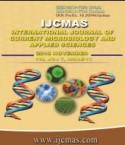


 National Academy of Agricultural Sciences (NAAS)
National Academy of Agricultural Sciences (NAAS)

|
PRINT ISSN : 2319-7692
Online ISSN : 2319-7706 Issues : 12 per year Publisher : Excellent Publishers Email : editorijcmas@gmail.com / submit@ijcmas.com Editor-in-chief: Dr.M.Prakash Index Copernicus ICV 2018: 95.39 NAAS RATING 2020: 5.38 |
Conservation agriculture (CA) is based on principles of minimum soil disturbance through zero or minimum tillage operations, residue retention on soil surface and crop diversification which not only improves healthy functioning of soil but also enhances nutrient availability, its biological quality and aggregate formation. On the other hand, conventional tillage (CT) practices characterized by excessive tillage, residue removal and monoculture are often associated with the degradation of soil mainly in terms of depletion of SOC, sub-soil compaction and loss of biodiversity. Therefore, field experiment conducted with zero tillage, zero tillage + residue along with CT (control) under the most predominant cropping systems i.e. Jute-Rice-Wheat/lentil/Mustard systems to assess the dynamics of soil quality status in sandy loam soils of Indo-Gangetic plains. Surface soil samples were collected and analyzed for soil physico-chemical properties (pH, Electrical conductivity: EC; Bulk density: BD; Mean weight Diameter: MWD; Soil Organic Carbon: SOC; and Available N, P and K). The results revealed that soil organic carbon (SOC) was significantly and positively correlated with clay content (0.99**), MWD (0.83**) and Av-N (0.68**) but negatively correlated with BD (-0.74**). Evaluation of soil quality using soil quality index (SQI) under different tillage and cropping system showed that soil quality was better in Jute-rice-lentil (range: 0.42-0.62) under zero tillage with residue as compared to the other systems. The higher index values implied that SQ under that management is better as compared to other treatments. This indicated that minimum soil disturbances coupled with residue retention improved and/or optimized soil properties and provided better soil environment for plant growth. The tillage that caused destructive effects on soil quality should be discouraged for long-term cultivation to maintain good soil health for sustainable agricultural production.
 |
 |
 |
 |
 |